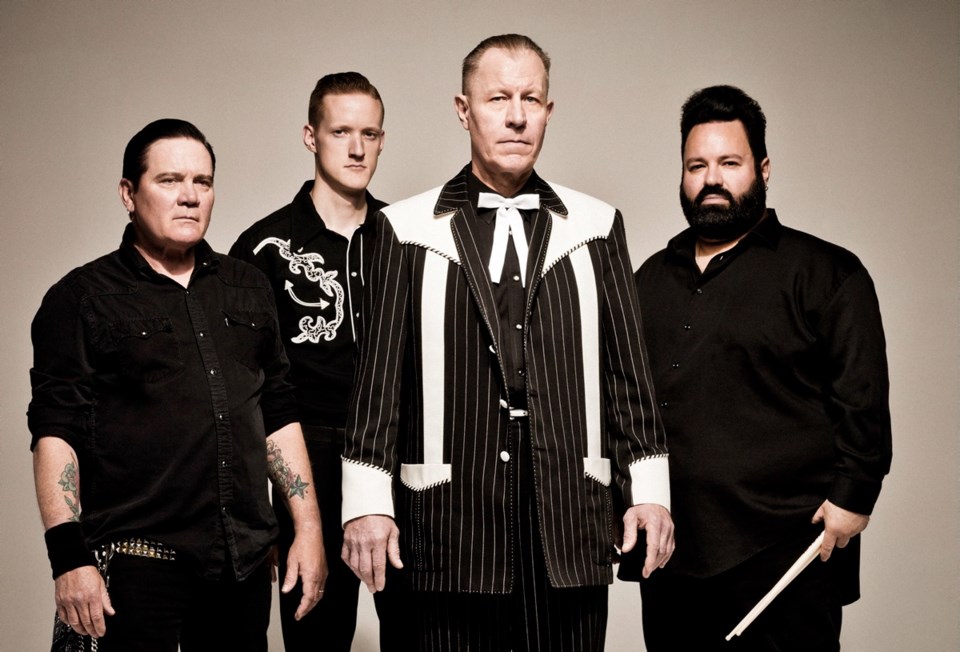IN CONCERT
What: Reverend Horton Heat with Bloodshot Bill, the Delta Bombers and the Hooten Hallers
When: Sunday, June 16, 8 p.m.
Where: Distrikt Nightclub, 919 Douglas St.
Tickets: $35.21 from Lyle’s Place, 770 Yates St.; the Strathcona Hotel and ticketweb.ca
As singer-guitarist Jim Heath remembers it, the Reverend Horton Heat was something of an anomaly when the Dallas rockabilly act started touring widely in the late 1980s.
The Stray Cats, the biggest rockabilly band of the modern era, had just broken up, and there was only fleeting competition from bands such as the Blasters and the Paladins. That proved to be an advantage, and kicked off a 33-year career that is still going strong.
“Without bragging too much, we have our own deal, our own thing,” Heath said, with a deep, dark twang to his voice. “We’re kind of unique.”
The frontman for the Texas rockabilly quartet offered plenty of insight during his recent interview with the Times Colonist. He was ostensibly on the phone to promote Whole New Life, the 12th album by the Reverend Horton Heat, but he did very little shilling. Heath would rather converse than coerce.
Touring has been the focus for the band almost since its inception, with Heath committed to long tours as a way of spreading his rockabilly gospel. With the recent addition of piano player Matt Jordan to the trio of Heath, drummer RJ Contreras and bassist Jimbo Wallace, the Reverend Horton Heat now has a fuller sound.
The group doesn’t stay in one place for too long, so fans wanting to see its dynamic live show, outfitted with reams of vintage gear, won’t have to wait long.
“[Live] has always been our thing,” Heath said. “I’ve refined it even more. The whole concept now is that music is an art form to be played live. I think we got a little confused with the technology of recording. I love recording and making records. But my art form is live music. I look at that and recording as two separate art forms.”
Early albums by the group were produced by Ministry’s Al Jourgensen, Gibby Haynes of the Butthole Surfers and Alice Cooper producer Thom Panunzio, which led to a contract with Interscope Records.
Collaborations with everyone from Motörhead to Jerry Lee Lewis followed, giving the group cachet with a diverse audience, from rockabilly enthusiasts to punk rockers. The sessions for Whole New Life found the common ground among all the influences, adding more depth to what has become the Reverend Horton Heat’s singular sound.
“You’ve go to find your own style, your own voice. I used rockabilly as a platform, and we had guts enough to go outside that boundary and something that was more country or something that had a harder sound.”
Heath saw his share of juvenile correctional facilities before making the switch to music, which gave him an edge when the band was starting out. That isn’t evident in conversation these days.
Now 60, he’s almost like an elder statesman. Raised in Corpus Christi and San Antonio, Heath has also lived in Austin and Houston, which makes him the closest thing to a Texas historian when it comes to modern-day rockabilly.
He is fascinated by the history of rock music, and made note during our conversation of the effect Texas had on Elvis Presley, “who played all the little towns in Texas, places like Crockett and Longview” before he was famous, according to Heath.
“There’s a lot of Texas in me. I figured that out a long time ago. That’s what I am. I’ve got this accent, I might as well play up to it and do the whole thing.”
During a recent show in Texas, at the House of Blues in Dallas, Heath stopped the set to commemorate Wallace’s 30 years in the group. “We gave him a trophy. It was more like a plaque, actually. We also gave him this tiki totem pole. Man, it was a tree trunk, basically. It was a totem pole of Jimbo, and when we wheeled that thing out on stage, it was pretty exciting. A totem pole, but made to look like Jimbo? It was a good effect.”
Heath purchased the curio years ago from a fan at a show in Portland, Oregon. The artist said he would sell the pole to Heath for $400 (400 Bucks is the name of one of the band’s most popular songs). Heath bought it, knowing he would eventually give it to Jimbo for his three decades of service, “instead of a 30-year watch.”
It was his way of celebrating not only Wallace’s tenure but the group’s endurance. “There’s a lot of great bands in Texas that cannot get out [of the state] and play all these places. It just doesn’t translate.
Great, great artists like Dale Watson, who doesn’t go to California anymore, but in Texas he’s a king. My band is lucky. We pretty much translate everywhere we go.”



